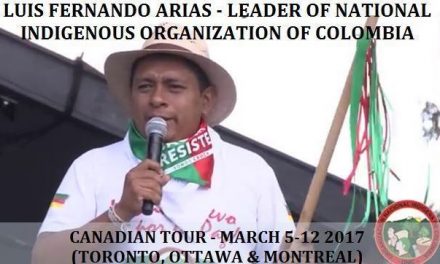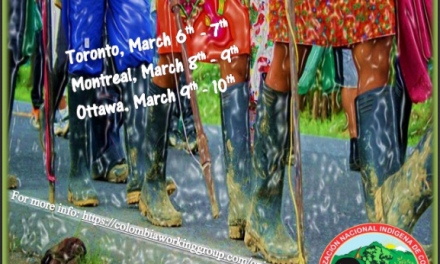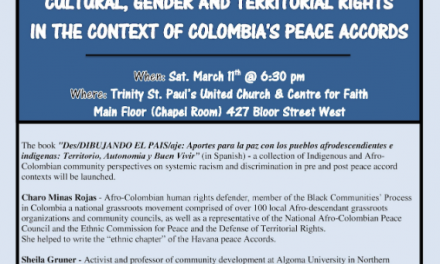Peace at Risk in Colombia
As the world celebrates the peace accord between The Revolutionary Armed Forces of Colombia (FARC) and the Colombian government, the social conflict in the country continues. A wave of killings and assassination attempts has hit Colombian human rights defenders, social and labor leaders. According to the Somos Defensores semester report 51 community leaders have been killed this year in Colombia.
At least 13 activists who have been promoting peace with the FARC have been assassinated in Colombia since the government announced a ceasefire according to country’s human rights office. The assassinations took place in areas where the FARC is set to demobilize after a peace deal is signed.
Media reports indicate that in the past two weeks 16 killings and other aggressions against community leaders have taken place. Protections for labor leaders and human rights defenders are basic principles necessary to achieve a lasting peace, and as has happened in other peace processes violence has actually increased.
- On September 15th William García Cartagena a lawyer for many years with the office of the Human Rights Ombudsman, defending victims in Segovia, home to conflicts between small miners and mining multinationals like Canada’s Gran Colombia Gold was assassinated in Medellin.
- On September 14th Ovidio Alrey Bustamente Chaviria was assassinated in his house in the municipality of Puerto Valdivia in Bajo Cauca Región. He was member of the association of peasants of the lower Cauca region (ASOSBAC).
- On September 13th Alexander Castro a labor leader from the Colombian Oil Workers Union (USO) survived an assassination attempt in the city of Barrancabermeja while meeting with workers.
- On September 11th, Néstor Iván Martínez a member of the Afro-descendant Community Council of La Sierra, El Cruce and La Estación was shot dead by unknown assailants in the Municipality of Chiriguaná. Néstor was a leader of the People’s Congress social movement who defended land rights and opposed mining in the region. The same day Alvaro Rincon was killed by the Colombian army in San Pablo Sur de Bolivar he was holding his child in his arms, according to a witness.
- On September 11th Alvaro Rincón Galán a farmer and community leader was assassinated on his front door step by the Colombian military, New Granada Battalion in the village of Patio Bonito municipality of San Pablo, Bolivar Department.
- On August 29th armed men wearing military uniforms and carrying rifles intercepted vehicles on their way to the local marketplace and detained Joel Meneses Meneses, Nereo Meneses Guzman, and Ariel Sotelo, members of the organization, the Committee of Integration of the Colombian Macizo (CIMA). Their bodies were later found withmultiple gunshot wounds in Monte Oscuro, at the border between the municipalities of Bolivar and Almaguer.
- During that same week four members of the Awá Indigenous peoples were shot dead by unidentified gunmen in the department of Nariňo including, Diego Alfredo Chirán Nastacuas, Camilo Roberto Taicús Bisbicús, leader of the Awá Indigenous reservation of Hojal La Turbia and brothers Luciano Pascal García, and Alberto Pascal García.
“The authorities must take immediate and effective action to once and for all put an end to the spate of recent killings of human rights defenders and social and community activists,” said Amnesty international.
Over the next few weeks, the UN Committee on International Covenant on Economic, Social and Cultural Rights will evaluate Colombia on its compliance with the International Covenant on Civil and Political Rights. We ask the UN Committee to take into account the shadow reports submitted by social organizations and propose strong recommendations to the Colombian government in order to support the peace process.
The Colombian government unilaterally halted the peace talks with countries second largest guerilla force, The National Liberation Army (ELN). It is equally important that the Santos government undertake public and genuine peace negotiations with the ELN and EPL
The participation of social movements in the peace process and their demand for the establishment of civil society negotiation table to address the social conflict which is at the root of the armed conflict has not been seriously addressed by the Colombian government.
We ask Ecopetrol, the largest petroleum company and the Colombian state to take undertake immediate measures to protect USO labor leaders and to publicly denounce the threats and assassination attempts against them.
We ask the Colombian state to take measures to protect human rights defenders, and members of social organizations and to put an end to impunity for cases of violence against human rights defenders which are at an alarming 95% impunity.
The Colombia Working Group is a platform of Canadian unions, NGOs, and social organizations focused on human rights in Colombia.





